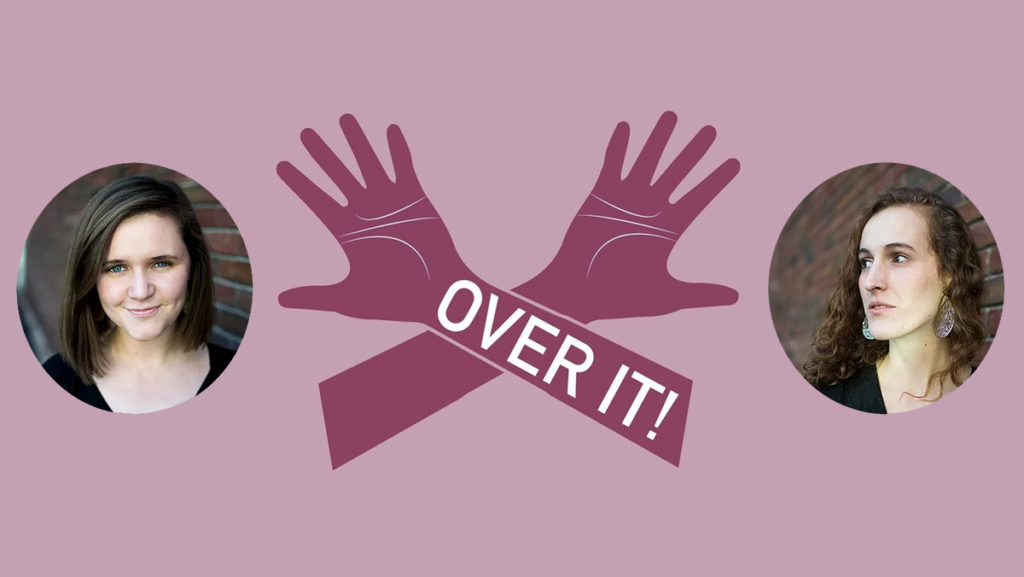Katelyn Harrop ’16 and Emma Rizzo ’16 have always been a pair: When they were students at the Roy H. Park School of Communications, they were roommates, partners in their Journalism Ethics class, and writers for Buzzsaw magazine. They also interned at WRFI Radio at separate times throughout their four years.
Now, the duo, passionate about journalism and infuriated by the state of the country, has come together and created a podcast called “Over It!” to publicize social justice initiatives.
“This is the time to do that thing you said you were going to do,” Rizzo said. “Because things are moving, and it’s time to take action.”
Recording from their closets — “sound-sealed” spaces — Harrop and Rizzo familiarized listeners with their podcast during their first episode by chatting about the Women’s March on Washington, President Donald Trump’s cabinet nominees and his administration’s failure to recruit a tribute band for the inauguration.
Rizzo said the election was the final push to start a podcast.
“After the election, there was this sense of, ‘Oh my God, something big is about to happen.’” Rizzo said. “There was this sense of urgency. It’s now or never that people our age need to start talking about these issues.”
Harrop and Rizzo went on to talk about their plans to go to the march, which they attended Jan. 21. The following Wednesday, for their second weekly episode, the two former roommates tackled white, cisgender feminism in relation to the march.
The duo played a recording of Tamika Mallory, lifelong activist and co-chair of the march, who said, “To those of you who for the first time felt the pain that my people have felt since they were brought here with chains shackled on our legs, today I say to you, welcome to my world.” Harrop and Rizzo dove into how feminism will be redefined under a new administration. For the first time, Harrop said, white women, including Harrop and Rizzo, are beginning to relate more directly to the immediate threats and human rights violations that have for decades been placed on marginalized groups in America. She said white women are finally confronted with similar realities as their personal livelihoods are also attacked.
Each episode of “Over It!” will feature an interview with someone who is doing advocacy work. In the second episode, for example, Harrop interviewed Jacob Pwakim, an organizer of a sister march in Jos, Nigeria, over video chat.
“Talking isn’t enough anymore,” Harrop said. “You have to be involved, and you have to be doing something on an individual level, and so we wanted to offer a space to showcase the people who are doing that.”
Anthony Adornato, assistant professor in the Department of Journalism and former professor of both Harrop and Rizzo, said the podcast taps into the emotions and confusion of a divided country.
“I think this cuts across all demographics who are very confused right now,” he said. “I think that they’re figuring out a way to process what’s going on no matter what side you’re on, so I think it has the potential to kind of lend a voice to that.”
Harrop and Rizzo said they want to inform listeners of initiatives by social justice advocates around the world with their podcast while engaging with the audience on a personal level — a goal that came to mind after the election, when it became clear to them that action was long overdue.
“We felt that there were a lot of podcasts that were either very conversational — kind of just a couple people chatting about life … or they were very hard news and very serious, and we wanted something that was a hybrid,” Harrop said.
Another benefit of a podcast as opposed to a print or video series, Adornato said, is that podcasts are one of the few forms of news media that can remain lengthy and still be engaging for listeners. The 35- to 45-minute episodes give Harrop and Rizzo enough time to be chatty with listeners, establish the personal connection they strive for and dig deep into social issues.
Going into the endeavor, one of their biggest concerns was getting guests every week, which Harrop and Rizzo said was much easier than expected. Jeff Cohen, director of the Park Center for Independent Media, said the ability to bring engaging guests to the table each week is key. Cohen also advised them at Buzzsaw and is their former professor.
“If they could do a podcast with Noam Chomsky or Naomi Klein, which is not out of the question, … something like that helps,” Cohen said.
Harrop and Rizzo embraced social media to promote their podcast, remaining as conversational in their tweets as they are in the show.
“Tell us your deepest protest fantasies… #overitpodcast #protest #inauguration,” Harrop tweeted Jan. 20.
Harrop and Rizzo have yet to monetize “Over It!,” but Harrop said what they have already learned is irreplaceable, both to themselves and to their listeners. The duo does not claim to know everything: Instead, the pair aims to connect listeners with the “doers” of the world.
“We’re not experts.” Harrop said, “We’re just over it,”
The latest episode of “Over It!” is accessible for free online through iTunes, SoundCloud and Stitcher.














